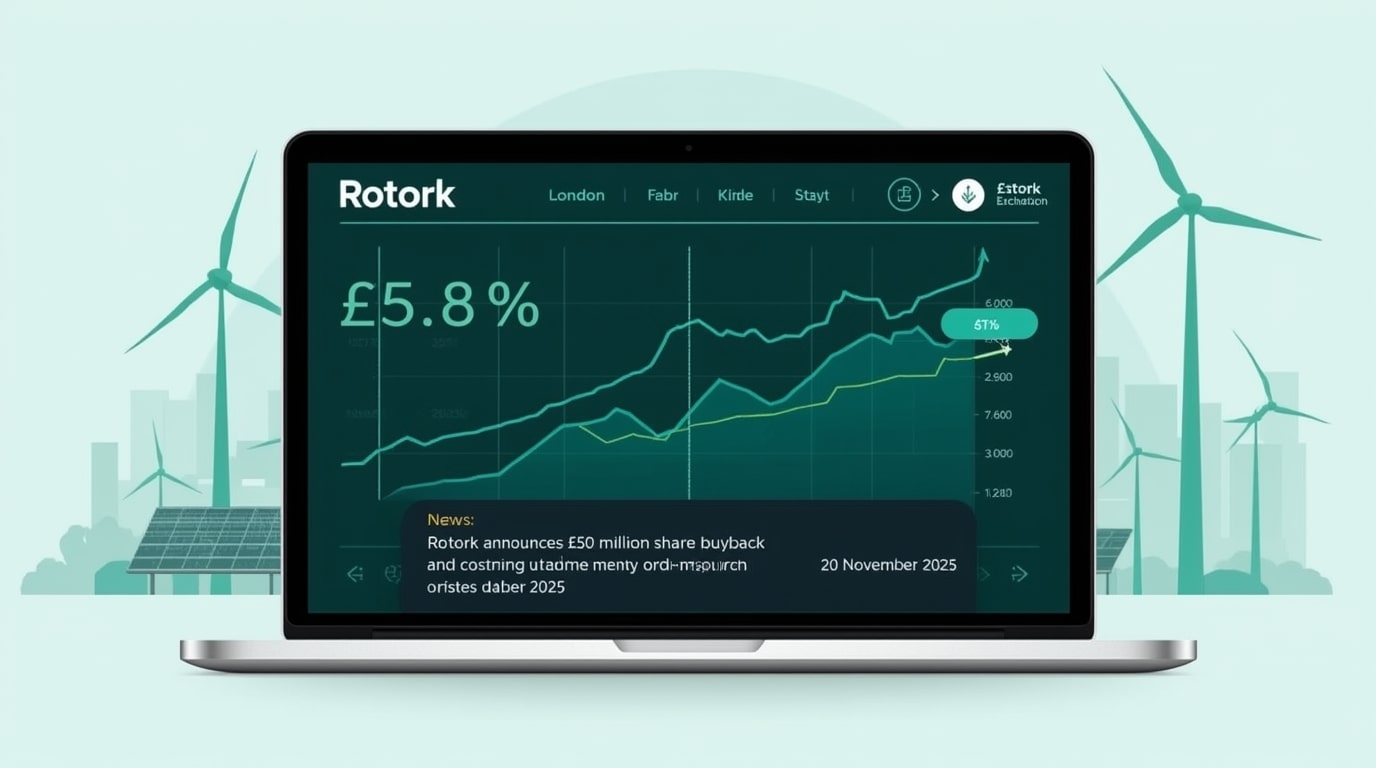
Rotork Shares Jump 8% as Industrial Valve Giant Launches £50M Buyback and Reaffirms Guidance Amid UK Engineering Revival
Rotork plc, the FTSE 250-listed actuator specialist, sparked an engineering stock market rally now, by announcing a PS50m share buyback, which saw its shares rise more than 8% in the mid-morning session on the London Stock Exchange.
The action, with a stable full-year financial perspective, hints at a strong level of confidence in the company to be in the successful clean energy and industrial automation industry, defying a greater industry downturn.
The press release highlights Rotork’s strategic shift to high-margin growth opportunities such as hydrogen infrastructure and offshore wind projects as the world goes through decarbonisation. The management has emphasised strong order intake across sustainable technologies as one of the pillars of its resilience because its bookings have increased by 12% so far.
Rotork also continues to project underlying operating profit continuing at PS140 million to PS150 million with a slight increase in revenue of 5-7% despite headwinds in supply chain volatility and geopolitical tensions, challenges to a fiscal year ending in December 2025.
This optimistic opinion comes against the backdrop of the new dawn of optimism in the UK industrials as government subsidies of net-zero activities have triggered capital expenditure.
Recent signs by the Chancellor on the prospective Budget of improved R&D tax credits have added to the optimism, with companies such as Rotork, a major supplier of utilities and the oil industry, moving over to renewables, being the best beneficiaries. The stock that had been trading at 312 pence before the news, increased to 338 pence by noon and bringing close to PS200 million to the market cap of the firm and was better than the flat performance of the FTSE 250.
Analysts celebrated the buyback as a pure vote of confidence, and a number of them have raised their targets. The London-based equity researcher noted that Rotork is not affected by cyclical declines in more traditional manufacturing due to its exposure to the electrification megatrends.
The programme is to be implemented in the next six months through open market purchases so as to optimise capital structure and to increase shareholder returns, where a progressive dividend policy still remains at 14.5 pence per share.
The wider British engineering tide of fortune that Rotork has been part of has seen exports to Europe and Asia bouncing back since Brexit. The actuators used in the company are electric, which are critical in controlling the flow accurately in the pipelines and turbines, and their demand has increased due to the spillovers of the Green Deal and the US Inflation Reduction Act in the EU.
Examples of this diversification can be recent contracts in Saudi Arabia in blue hydrogen push and projects in Scottish tidal energy farms to decrease dependence on fluctuating oil and gas areas, which currently contribute to less than 30% of revenues.
UK Budget Looms: Will Fiscal Boosts Supercharge Engineering’s Green Shift?
The spillovers of the disclosure by Rotork even spread to the peer companies, as the FTSE 250 industrials index surged by 1.2% intra-day. Shares in Weir Group and IMI plc shot up 4-6% as traders shifted into the defensive growth trades, as US elections remained uncertain.
The wider FTSE 100 of London managed a 0.1 per cent rise, on both its back, which was helped by mining recoveries, and on the front which was held back by the banking sector after the inflation print of yesterday.
Economists ascribe this sectoral strength to structural tail winds. UK manufacturing PMI has been over 50 in three months in a row, which is a signal of growth due to automation and investments in sustainability.
However, there are still problems: a shortage of labour in skilled trades and high prices on raw materials due to the disruption of the Red Sea would put pressure on margins unless addressed. In a short announcement, the chief executive of Rotork has underlined proactive hedging and diversification of supply as the ways to protect profitability, and hinted at bolt-on acquisitions in digital valve technology.
To Rotork, this is a decade of vindication since it traces its history to 1958 as a leader in the automation of valves. The company, which was briefly delisted in the 2000s, has been steadily rebuilt, recording an 8% annual growth in earnings since 2020. With a huge PS280 million order book, the highest in its history, it gives it a presence till 2026, and 40% of those deals are long-term energy transition contracts.
Appetite among investors is obvious in the trading frenzy: trading volumes tripled the norms, with ESG-oriented funds being active in the buys. The high forward P/E of the stock of 18 times is supported by a projected EPS growth of 15% as per consensus estimates. There is a buzz of index upgrades, and passive inflows may soon be opened with Rotork seeking to join the FTSE 100.
UK Budget Looms: Does Fiscal Stimulus Revitalise Green Shift at Engineering?
With the Autumn Budget looming on November 25, the calls for selective incentives are increasing at Rotork. The lobbyists in the industry are calling on the government to extend the full expensing regime on capital equipment, saying that it would be able to unlock PS10 billion worth of investments every year.
The inability to deliver could stop the flow, considering that China has been dominating the solar and battery supply chains and the threat of some of its companies being considered a threat to its competitors.
Rotork has a blueprint of its playbook: unstoppable innovation, with recent introductions of artificial intelligence-enhanced predictive maintenance software that reduces client downtime by 25. It is the nexus of Industry 4.0 and net-zero demands through its collaborative ventures with Siemens and ABB on smart grid integrations. The cash generation is also exceptional, and the amount of free cash flow is sufficient to finance organic growth or a takeover acquisition.
Sceptics are warning against exuberance. A likely sterling recovery on the back of expected BoE rate freezes may undermine the competitiveness of exports, and new tariffs under a new administration would upset transatlantic operations. However, the debt-free balance sheet of Rotork net cash of PS40 million, is a weapon that allows it to overcome turbulence.
To the shareholders, the current boom climaxes an excellent year with a 25% growth in the stock since the beginning of the year, which is above the standard. The payout of 2.5% on dividends and the buyback, which is effective at 4% at present prices, compounds the feast. Those contrarians who look at downturns might do so with profit, but the trend is upwards, tied to the relentless advance of humanity toward the vision of sustainability.
Essentially, this is a milestone of the UK industrial reinvention story at Rotork. With the decline of the legacy sector, the engineering torchbearers such as this Bath-based inventor shine a light on the future, with traditional craftsmanship and progressive optimism. As the global energy demands transform the economies, Rotork will not only withstand but it will also prosper in the green frontier.



 Bitcoin
Bitcoin  Ethereum
Ethereum  Tether
Tether  XRP
XRP  USDC
USDC  Solana
Solana  TRON
TRON  Lido Staked Ether
Lido Staked Ether  Cardano
Cardano  Avalanche
Avalanche  Toncoin
Toncoin